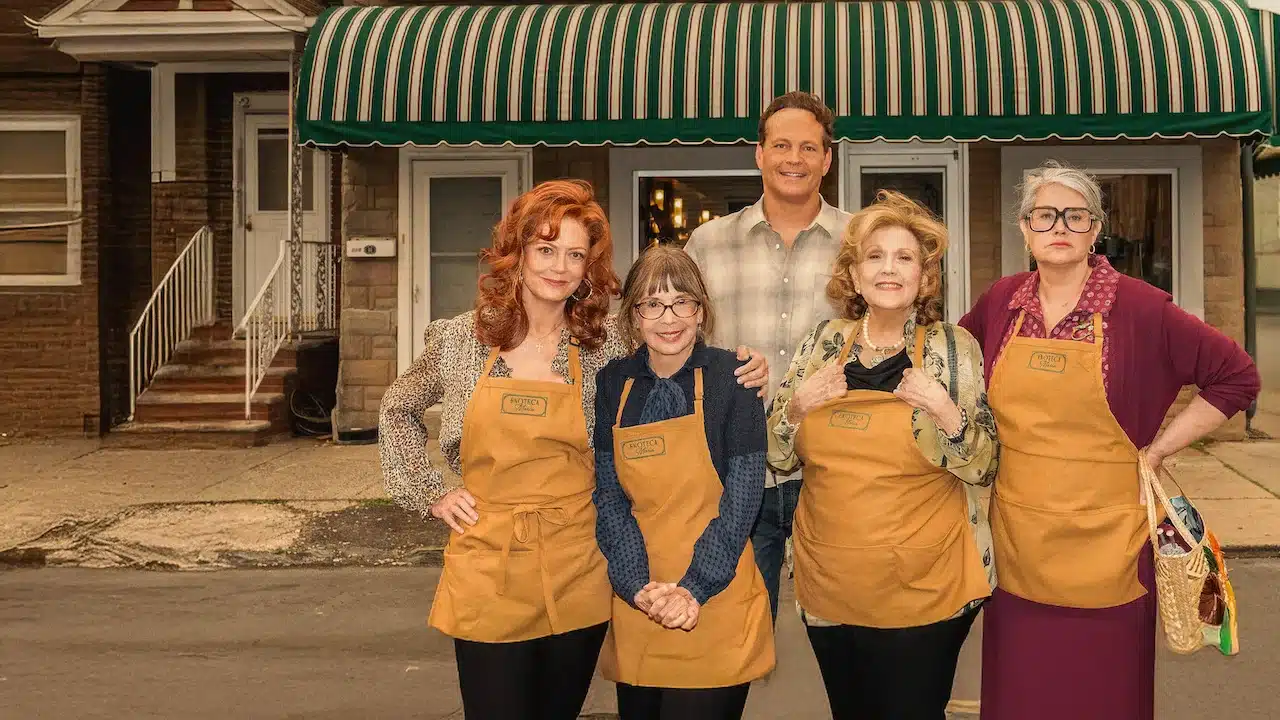Benedict Andrews’ reinvention of Chekhov’s The Cherry Orchard at St. Ann’s Warehouse raises the devastating question of our era: When change comes, what becomes of the world we’re about to discard?
Nina Hoss plays Ranevskaya, an aristocrat consumed by a desire for self-destruction after her son’s death. “She’s a genius at throwing money away,” her brother Gaev (Michael Gould) observes. Ranevskaya returns from Paris to her family’s crumbling estate, now burdened by debt.
The once-glorious cherry orchard is set to be auctioned off, offered as collateral for a mountain of unpaid bills. The old world, with its rituals, comforts, and self-soothing illusions, is vanishing.
Chekhov’s final play, written on the brink of the Russian Revolution, has never felt more prophetic. Onstage, cans of condensed milk, bottles of kvas, and other Soviet-era relics evoke the chaos of 1990s Russia — but the unease belongs just as much to America in 2025.

The Cherry Orchard, directed by Benedict Andrews, at St. Ann’s Warehouse. Photo by: Amir Hamja.
Trofimov (Daniel Monks), the eternal student, now speaks about endless consumption, the struggling middle class, immigrants, and a “proto-fascist tech oligarchy.”
His target isn’t just the system — it’s Anya (Sadie Soverall), Ranevskaya’s idealistic daughter and his admirer. Her family’s privilege, he implies, comes at a cost. “The cycle of injustice needs to end — for good,” he tells her.
But Trofimov, too, has nothing to offer but destruction. His self-righteousness and lack of empathy are repellent. “Try being compassionate for once,” Ranevskaya tells him, not unkindly.
Lopakhin (Adeel Akhtar), the peasant-turned-businessman, proposes a bluntly practical solution: save the estate by chopping down the orchard and leasing the land for “dachas” (summer cottages). The plan is obvious, but for Ranevskaya and the others, the idea is unthinkable.
Lopakhin is both shrewd and conflicted, intoxicated by wealth and power. He flirts with Varya (Marli Siu), Ranevskaya’s adopted daughter, but his affections lie elsewhere. In the end, Lopakhin buys the estate, but his acquisition seems to come at the cost of any real sense of fulfillment.
Still, the play leaves a light and uplifting aftertaste. The audience laughs as the world quietly falls apart.


The Cherry Orchard, directed by Benedict Andrews, at St. Ann’s Warehouse. Photo by: Amir Hamja.
Andrews brings out the humor in Chekhov’s tragicomedy, creating an almost carnivalesque atmosphere, where the eccentric servant Charlotta (Sarah Amankwah) and the hapless neighbor Pischik (David Ganly) drift through the chaos like Pierrot and Colombina.
The love triangle between the three servants — Yasha (Sarah Slimani), Dunyasha (Posy Sterling), and Yepikhodov (Éanna Hardwicke) — is both sad and hilarious, with a gender-fluid twist, as the female actor plays a male role.
Andrews modernizes Chekhov by cutting through both time and space. Actors are seated among the audience when offstage, so the connection feels immediate and inescapable. The viewers become the cherry orchard itself — and fragments of a world that’s slipping away. Gaev addresses one audience member as a bookcase; later, Ranevskaya refers to others as “a table and a chair.”
Yet at its core, despite the connection so skillfully created, what unfolds is a story of quiet, devastating betrayal.


The Cherry Orchard, directed by Benedict Andrews, at St. Ann’s Warehouse. Photo by: Amir Hamja.
Firs (Karl Johnson), the old servant left behind in the empty house, and the sound of the orchard being cut down are not just symbols — they are casualties of the new era that is yet to arrive. And, based on Russia’s history, it’s likely that the new era born from destruction won’t be better — just bloodier and more brutal. As Trofimov puts it, “There’s no progress, just lies.”
Among the many exceptional directors who’ve reimagined Chekhov — Trevor Nunn, Ian Rickson, and Robert Icke — Benedict Andrews stands out. His Three Sisters at London’s Young Vic was unforgettable, but with The Cherry Orchard, he deepens his vision, making Chekhov feel more urgent than ever.
This post was written by the author in their personal capacity.The opinions expressed in this article are the author’s own and do not reflect the view of The Theatre Times, their staff or collaborators.
This post was written by Victoria Zavyalova.
The views expressed here belong to the author and do not necessarily reflect our views and opinions.















